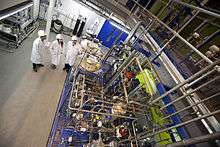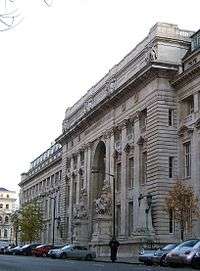Department of Chemical Engineering, Imperial College London
|
Department main entrance | |
| Established | 1912 |
|---|---|
| Type | Department of Engineering |
| Parent institution | Imperial College London |
| Location | London, United Kingdom |
| Head of Department | |
| Academic staff | 42 |
| Undergraduates | 500+ |
| Postgraduates | 80+ |
| Doctoral students | 200+ |
| Website | http://www.imperial.ac.uk/engineering/departments/chemical-engineering/ |
The Department of Chemical Engineering is located in the South Kensington campus of Imperial College London, occupying the Aeronautics and Chemical Extension (ACEX), Bone and Roderic Hill buildings. Formally inaugurated in 1912,[1] the Department is the centre of teaching and research in Chemical and Process Engineering at Imperial College. It has over 40 faculty members, 100 postdoctoral researchers, 200 PhD researchers, 80 taught postgraduates, and 500 undergraduates. The current Head of Department is Professor Nilay Shah.
History
Following the grant of a Royal Charter for the formation of Imperial College in 1907, a Department of Chemical Technology was proposed in 1908 and formally opened in the year 1912, housed within the Department of Chemistry in the Royal College of Science.[1] Professor William Bone was appointed the first head of the Department and oversaw the construction of the new building on Prince Consort Road to house it. In 1931, the first Postgraduate Course in Chemical Engineering began, followed in 1937 by the first Undergraduate degree in Chemical Engineering. The first four-year undergraduate degrees were established in 1980 and in 1989, Professor Roger W. H. Sargent founded the Centre for Process Systems Engineering in the Department. In 2003, the first MSc in Advanced Chemical Engineering was introduced.
Research
Much of the research at the Department is collaborative with staff and students working on different projects simultaneously. Research in the Department is broadly divided into five Laboratories and four Domains. The fundamental research platforms are categorised as 'Laboratories' while the key application areas of the research are classified as 'Domains'.
Research domains
- Bio-Driven Chemical Engineering that stands at the interface of engineering and biological/medical sciences.
- Energy/Sustainability Driven Chemical Engineering aimed at developing and enhancing ways to deliver energy sustainably.
- Molecular/Materials Driven Chemical Engineering research to gain a better understanding of materials through modelling and characterisation.
- Multi-scale Driven Chemical Engineering research that reduces the complexity of systems from factory to molecular scales.
Research laboratories
- Materials Laboratory
- Physical Properties and Analytics Laboratory
- Transport and Separation Laboratory
- Reaction and Catalysis Laboratory
- Systems Laboratory

Research interests of individual staff members and their research groups can be found here
Facilities
The Department has multiple labs outfitted with state-of-the-art equipment and facilities to help students undertake their research including an Analytical Services Lab with more than 20 major instruments, a Mechanical Workshop to design and manufacture prototype equipment and a Carbon Capture Pilot Plant. The £2 million Carbon Capture Pilot Plant, which opened in 2012, is housed in the Department and is the most sophisticated of its kind in an academic institution in the world.
Study
The Department provides courses in Undergraduate and Postgraduate study that rank among the top courses within the UK and worldwide.
Undergraduate
The undergraduate program at the Department is a 4-year integrated course leading to an MEng degree in Chemical Engineering including an option to study a year abroad. There are also options for two specialist streams in Fine Chemicals Processing (delivered jointly with the Chemistry Department) and Nuclear Engineering (delivered jointly with the Department of Materials and Mechanical Engineering)
All students graduating with the MEng degree also automatically receive an Associateship of the City and Guilds of London Institute.
Summer school
The summer school offers a five to six week programme at the Department for groups of international chemical engineering students in their junior or senior year. The course comprises laboratory experiments, courses and training modules on the Pilot Plant in the Department.
Postgraduate
The Department has a large research portfolio and offers a PhD degree programme, four full-time MSc programmes and one part-time course.
PhD programme
The PhD in Chemical Engineering is a 3-year research degree which involves conducting work in one of the Department's Research Domains, The Centre for Process Systems Engineering and Qatar Carbonates and Carbon Storage Research Centre.
MSc programme
The MSc programme at the Department offers students the opportunity to explore advanced topics in chemical engineering and develop their research and professional skills. The programme has one of four options:
- MSc in Advanced Chemical Engineering
- MSc in Advanced Chemical Engineering with Process Systems Engineering
- MSc in Advanced Chemical Engineering with Structured Product Engineering
- MSc in Advanced Chemical Engineering with Biotechnology
Part-time postgraduate programme
The Process Automation, Instrumentation and Control (PAIC) postgraduate program offers short term and CPD courses for subjects in professional automation, instrumentation and control systems.
International standing
The Department of Chemical Engineering at Imperial College London is widely recognised as one of the best in the world. According to the 2015 QS World University Rankings, Imperial was the sixth best university in the world for chemical engineering.[2] According to the Research Excellence Framework results published in 2014, Imperial had the greatest concentration of high impact research among major UK universities [3] and ranked top three overall for the Aero, Mechanical, Chemical & Manufacturing Engineering unit.[4]
Partnerships
The Department has a long history of inter-disciplinary projects with other departments, institutions and industry. Some recent and ongoing collaborations include:
- Qatar Carbonates and Carbon Storage Research Centre (QCCSRC)
- BP International Centre for Advanced Materials (BP-ICAM)
- Energy Futures Lab
- Engineering Medicines Lab
- Transient Multiphase Flow Consortium
- Centre for Process Systems Engineering (CPSE)
- Institute for Molecular Science and Engineering (IMSE)
- Sustainable Gas Institute (SGI)
Notable Alumni
- William A. Bone FRS - Head of the Department from 1912 to 1936 and renowned fuel technologist and chemist.
- Sir Alfred Egerton FRS - Professor of Chemical Technology at Imperial College London from 1936 - 1952 and Secretary of the Royal Society from 1938-1948.
- John Coulson - Achieved his PhD from the Department in 1935 and joined the academic staff thereafter, achieving the status of Reader. He is best known as the co-author of the textbook Coulson and Richardson's Chemical Engineering along with Jack Richardson.
- Jack Richardson - A BSc student of chemical engineering at the Department, Jack Richardson achieved his PhD in 1949 before joining the academic staff where he would later become Senior Lecturer. He is best known for his co-authorship of the Coulson and Richardson's Chemical Engineering series of books along with John Coulson.
- Professor Dudley Newitt FRS - Head of Department from 1952 - 1961. He served as the scientific director of the Special Operations Executive during the Second World War developing espionage technology for the British Government.[5]
- Professor Alfred Ubbelohde FRS - Head of the Department from 1961 - 1975. Author of six books and over 400 publications, the Ubbelohde effect (the increase in hydrogen bond length due to deuteration) is named after him. He is also credited with coining the term proton conductor.[6]
- Professor Roger Sargent FREng - Head of the Department from 1975 - 1988. Widely regarded as the father of Process Systems Engineering due to his research and widespread influence on the field. He was a Founder Fellow of the Royal Academy of Engineering in 1976.
- Sir William Wakeham - Head of the Department from 1988 - 1996 and chair of the Resource Audit Committee of the Engineering and Physical Sciences Research Council (EPSRC).
- Dame Julia Higgins FRS FREng - Acting Head of the Department from 2000 - 2001 and continuing Emeritus Professor and Senior Research Investigator. Widely known for her studies on polymer molecules with many breakthroughs in the field. She is also held in high esteem for her efforts in the advancement of women in the field of science engineering and technology. The Julia Higgins Medal and Awards at Imperial College London is named after her.
- Dame Judith Hackitt FREng - A graduate from the Department in 1975. She is currently the Chair of the Health and Safety Executive of the United Kingdom.
- Iain Conn - A graduate from the Department, he is currently the CEO of Centrica and former Group Executive Office of BP from 2004-2014.
- Ian Read - A graduate from the Department in 1974, Ian Read has served as the CEO of Pfizer since 2010.

